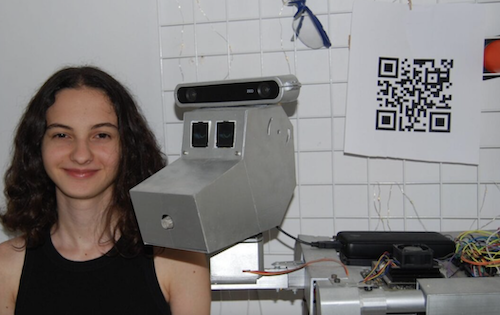This story originally appeared on NVIDIA’s blog and is reposted here with permission.
High school student Selin Alara Ornek is looking ahead–using machine learning and the NVIDIA Jetson platform for edge AI and robotics to create robot guide dogs for the visually impaired.
The project, called IC4U, is one of seven robots Ornek has created to date, including a school aid robot, named BB4All, that can help prevent bullying with real-time notification and health-monitoring capabilities.
About the maker
A high school senior from Istanbul, Turkey, Ornek has always had a passion for the intersection of AI, social good and robotics. She’s a self-taught robotics developer–in building IC4U, she used the Jetson Developer Kit as a sandbox to explore and experiment.
She is a member of AI4ALL, a nonprofit program with the mission to make AI more diverse and inclusive, and the New York Academy of Science. A global presence in the robotics scene, she’s been recognized at the European Youth Awards and Women in Tech Global Awards events. She placed first in the 2021 Istanbul Bosphorus Robot Cup and third at the 2023 OpenCV AI Competition.
Her inspiration
Ornek’s inspiration for creating IC4U came from a trip to France, where she saw a guide dog assisting its owner. Her late dog, Korsan, was also a key source of inspiration.
“I started to think about if a visually impaired person lost their dog, not only would they lose their best friend, but their eyes,” Ornek said.
The project was built to offer the visually impaired a companion not limited by aging and health.
Her Jetson project
Ornek initially used ultrasonic sensors located in IC4U’s eyes to detect obstacles. But after attending the 2021 World Summit AI as a panelist, she decided to develop new AI applications for the robot dog that’d enable it to mimic a real one.
The ultrasonic sensors only offered object detection from directly in front of IC4U, and Ornek wanted to expand detection to the robot’s entire surroundings.
The solution was using sound sensors located in the robot’s ears. IC4U can turn toward a sound and process visual information gathered by an integrated ZED 2i Wide-Angle 3D AI camera, which captures a wider range of visual data and helps detect information such as the size and speed of an object.
“To power the ZED 2i camera and for high-quality image processing, I used an NVIDIA Jetson Nano developer kit,” Ornek said. “I was so impressed with the ZED 2i camera’s performance that I didn’t want to limit its use to a simple object-recognition task.”
She began to think of other ways that IC4U could assist a visually impaired person. IC4U’s improved data processing from high-resolution sensors, powered by Jetson, enables it to detect city objects such as stop signs, traffic light colors and the denomination of paper money.
In addition, Ornek used the Jetson Nano to add a shopping feature to IC4U via web scraping from publicly available resources, aiming to one day expand it by partnering with online retail stores.
Back to school
In the long run, Ornek hopes to deploy IC4U for use in smart cities and spaces–continuing her exploration of AI applications with next-generation platforms like Jetson Orin.
This fall, she’ll begin studying computer science at the University of British Columbia on a full scholarship, as a recipient of the Karen McKellin International Leader of Tomorrow Award. She strives to encourage other youth, especially girls, that technology is fun.
Students and educators with a valid accredited university or education-related email address can sign up to purchase the Jetson Orin Nano or Jetson AGX Orin Developer Kit at a discounted rate. U.S.-based students and educators can visit Sparkfun to sign up for their discount–residents of other countries should check their eligibility (login required).
Learn more about the NVIDIA Jetson platform and NVIDIA Deep Learning Institute Jetson AI courses and certifications.
Related:
9 ways to create better makerspaces
How to use PBL with makerspaces across your curriculum
For more news on makerspaces, visit eSN’s STEM & STEAM hub


